THE ALGERIAN WAR
8. THE MARTYRED PROVINCE (1962)
THREE years after its inception, General de Gaulle’s plan was coming true and was leading implacably towards the desired goal : Algerian independence. Little by little, the mask of the deceitful discourses was falling and the distress of the most lucid minds was increasing. Calm still reigned in our French departments of North Africa, where the army continued to fulfil its function. In a year’s time, however, the abandonment of our beautiful Algeria would be complete. From April 1961 to March 1962, the negotiations undertaken by the French government with the Algerianrebellion would end in the victory of the worst.
In fact, strengthened by the referendum result of January 8, 1961, which prepared the accession of the FLN to power, de Gaulle unveiled his intention of resuming discussions with the GPRA in Tunisia. The first talks took place in February in Lucerne, Switzerland. The opening of the negotiations, which was announced on April 11 by a speech of the head of state, had as its immediate consequence to trigger the coup of Algiers on April 22. We have explained the motives and the faults. 1
UNDER TERROR
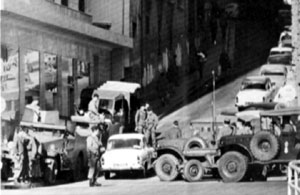 The generals’ failure allowed General de Gaulle, in accordance with Article 16 of the Constitution, to put Algiers under a state of siege and to complete the purge of the army and administration of all elements hostile to his politics. Several regiments were dissolved, two hundred officers put under close arrest. In the area of Algiers, two hundred civil servants, twenty-seven departmental councillors and twelve mayors were suspended, while in Oran, a hundred and fifteen CRS (policemen) were arrested. The papers Écho d’Alger and Dernière Heure were banned. The liberal Journal d’Alger continued to publish official falsehoods with no fear of being refuted.
The generals’ failure allowed General de Gaulle, in accordance with Article 16 of the Constitution, to put Algiers under a state of siege and to complete the purge of the army and administration of all elements hostile to his politics. Several regiments were dissolved, two hundred officers put under close arrest. In the area of Algiers, two hundred civil servants, twenty-seven departmental councillors and twelve mayors were suspended, while in Oran, a hundred and fifteen CRS (policemen) were arrested. The papers Écho d’Alger and Dernière Heure were banned. The liberal Journal d’Alger continued to publish official falsehoods with no fear of being refuted.
Each evening, the districts of Algiers were sealed off by a considerable police and military presence. Sainte-Marie’s church was searched. Apartments were searched without warrants. In several days, hundreds of arrests were made. Later on, certain “ suspects ” were found at Mustapha hospital who hadsuffered terrible tortures.
Msgr. Duval heaped opprobrium on these “ lost ” officerswhen he wrote on April 26 to the faithful of his diocese :
« I told you in my last Lenten letter : “ False prophets will come to you and will propose to you, not the truth, but flatteries and illusions. ” Despite the tragic circumstances and dangerous entreaties, those who went astray and were ready to use any means whatever were only a small minority… It is brotherly love, with all it entails, respect for the human person, for every human person, which will allow you to put yourselves in the service of Algeria, which needs you. The best guarantee of your rights is your will to cooperate in the construction of Algeria. »
To cooperate with whom ? With a government whose goal was to abandon the province and pave the way for the FLN ? This warning provoked the indignation of many of the faithful. Several parish priests in Algiers refused to read it in thepulpit.
After the curfew, the citizens of Algiers gave themselves over to tumultuous concerts on the rhythm French Al-ger-i-a ! Women beat in time on their saucepans. It was an enormous, deafening hubbub. The wounded city was roaring aloud itswill to live.
AN UNEVEN CONTEST
The negotiations that opened on May 20, 1961 in Évian were, on the French side, accompanied with the most liberal measures : the transfer of Ben Bella and the criminals imprisoned with him to Turquant castle, the liberation of six thousandunilateral interruption of offensive military actions. The new commander-in-chief, General Ailleret, a technician rather than an officer familiar with the battlefield, was charged with planning the French military withdrawal. In the month of June, the main body of the paratroopers had regained metropolitan France.
For its part, the A.L.N. was careful not to observe the truce. Rebel bands re-formed with complete impunity. Most of the time they exploited the desertions that the obviously ineluctable outcome of the war encouraged, and an increase in terrorism, as they struck recalcitrant Europeans or Muslims without discrimination.
In Évian the conference was suspended on June 13, since the envoys of the FLN were making extravagant demands.
In fact, it was an uneven contest ever since Paris showed that it was more eager than the GPRA to put an end to the conflict. This was already signalled when in the previous March the GPRA signed, a “ protocol of cooperation ” with the USSR, which prepared the Sovietisation of Algeria and the Maghreb. The talks thus resumed on July 20, but once again failed over the questionof the Sahara and its rich mineral resources that the FLN coveted.
On September 5, de Gaulle made concessions and recognised that the Sahara would be part of the new Algeria...
But to « withdraw », he had to silence down to the last man those who refused such a betrayal inorder to defend their land and out of fidelity to their oath.
THE ORGANISATION OF THE SECRET ARMY
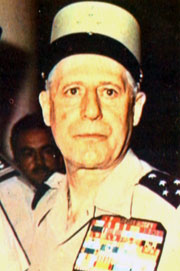
After the failure of the“ putsch ”, General Salan went underground. On May 28, he issued a proclamation : « From a very dear corner of this French land where I find myself by the grace of God, after the sorrowful events of the days of April, and after being solicited by the nationalist movements of Algeria, I have decided to assume leadership of the resistance to the policy of abandonment… I, Army General Raoul Salan, former civil and military commander-in-chief in Algeria, assume supreme command of the great movement of national renewal. I have decided to reunite all the patriots in a combat front, under the motto “ French Algeria or death ! ” »
« When I was convinced that on May 13, 1958, I had been fooled by a dreadful and sacrilegious comedy, he declared at his trial, I felt committed in conscience, before my peers, before my country and before God. On no account could I accept to be considered General de Gaulle’s accomplice in the martyrdom of French Algeria and in its abandonment to its enemy. If I deceived the people of Algeria and the army by shouting,“ Long live de Gaulle ”, it is because I myself had been deceived. But he who was commander-in-chief is duty bound, be it at the price of a life to which he consented the sacrifice when he entered Saint-Cyr (officer training school). Reparation would first of all be to remain in the midst of this people. » This language is worthy of Marshal Pétain !
Salan, who was advised by Robert Martel, intended to launch an insurrection at the beginning of the summer of 1961 with soldiers from Boufarik and colonists from the Mitidja. He still hoped to swing the army against de Gaulle. But he also had to take into account the OAS, the Organisation of the Secret Army, which was founded in February 1961 in Madrid by Pierre Lagaillarde and Jean-Jacques Susini, who were both former presidents of the students of Algeria. An OAS committee was formed in Algiers in the last days of April. It was led by the disturbing Susini and theenterprising Godard.
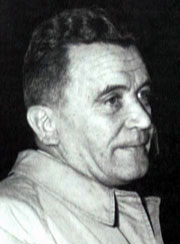
A former member of the Resistance on Glières plateau, Colonel Yves Godard had participated in the Battle of Algiers as General Massu’s chief of staff. A man of sangfroid and astuteness, trained in the intelligence school, he wanted to develop the OAS by giving it structures copied exactly from those of the FLN. On June 4, 1961, he presented to General Salan an entirely theoretical organisation chart that was intended to control the city of Algiers. His plan was to command the population and to wage a revolutionary war, i.e. terrorist actions against the FLN andthe Gaullist authorities.
In actual fact, the members of the OAS were already carrying out attacks, in the form of plastic explosives bomb attacks. It was a question of intimidating the adversary : agents of the government, FLN rebels, European Communists or liberals. At least initially, it was their belongings that weretargeted : houses, vehicles, stores, workshops.
For his part, Lieutenant Degueldre, a former member of the 1st REP, organised in Algiers the “ Delta commandos ”. Degueldre, who had joined the FTP resistance 2 at seventeen years of age, enlisted in the Foreign Legion in 1945. His courage under fire in Indochina and in Algeria allowed him to rise from the ranks, which is exceptional in the Legion. After Challe’s failure, he confided to Captain Sergent : « The FLN imposed itself through violence. Thanks to it, for the French government it became a recognised negotiator. Now, violence alone will allow us to have our say. » No ! The FLN became a “ recognised negotiator ” because de Gaulle and, before him, the politicians of the IVth Republic were in complete agreement with independence and because it benefited from considerable support on the international level.
On June 24, 1961, Captain Ferrandi, General Salan’s aide-de-camp, remarked : « The OAS staff in Algiers has decided to increase “ sporadic operations ” : they should have for main objective the repressive apparatus that is directed against us, those who direct it and those who assist it. We are engaging ourselves on a formidable slope. Who will determine its confines and the points where one can stop ? Will we be able to resist the inevitable thrust to violence ? Will we succeed in controlling it, guiding it, maintaining it within the limits that we have set today ? » 3
DE GAULLE – FLN
SAME COMBAT
When the government’s complicity with the fellaghas became obvious, above all during the unilateral truce, which provoked an upsurge of FLN extortion demands and attacks, the OAS had to fight on two fronts. State repression pursued all those who were suspected of sympathising with the Organisation. When these “ suspects ” fell into the hands of the policemen of Mission C in the “ Tagarins ”, of the anti-riot police at the Police school of Hussein-Dey, or of the secret government police agents in their villas, they suffered interrogations and torture that, in Salan’s opinion, « stretched the limits ofcruelty. »
In these conditions, it is understandable that the OAS commandos, under the orders of Lieutenant Degueldre, waged a fierce battle, in particular, against the secret government police. But recourse to terrorism was the grave error the result of which was to sully in the eyes of metropolitan France the just cause of French Algeria. It is not with revolutionary and immoral means that one can save a moral work like that of the French communityin Algeria.
LEGITIMATE DEFENCE OR TERRORISM ?
« The error of the OAS, Rieunier wrote, is to have answered Gaullism with its own weapons. Formerly, chivalry put violence in the service of the weak and the oppressed, but it had taken care to define its rules and limits. The OAS was free of stain from the cause it defended. It did not remain so due to the methods that it employed. But the methods that the leaders or soldiers of the OAS used in 1962 had been taught to them by de Gaulle on the BBC from London. » 4
It must be said also that the Secret Army, like all clandestine movements, was very quickly infiltrated by the police and the secret government police agents, who were recruited in metropolitan France in the “ field ” and sent to Algeria to infiltrate the nationalists, to act as provocateur, tokidnap them, or to assassinate them.
Our Father, who was a parish priest at Villemaur at that time, was favourable to the OAS for its defence of French Algeria, while condemning the methods it was using, which he did not understand. When he was arrested and kept in police custody in March 1962 by the Gaullists and episcopal powers acting odiously in concert, he spelled out his position in a letter for thebenefit of the brothers of the community :
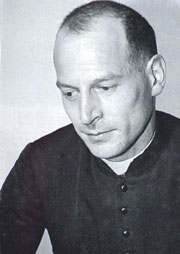 « Let us grasp the situation clearly : who began, who attacked persons and threatened the common good ? I consider the FLN criminal in its essential end and in its methods. Christian morality can never, ever sanction either granting them amnesty or giving in to their demands. That would be to the detriment of the peaceful populations that they have terrorised for so many years. Secondly, the Government is blameworthy for having breached the common good by dispensing itself of its supreme responsibility, that is, safeguarding persons and property and, at the same time, safeguarding the nation’s common good. Its actions are unconstitutional, illegitimate, and immoral; it is and will remain so when it makes it its intention to betray Algeria and hands it over to the FLN. The democrats’ invocation of the popular will makes no sense in morality : the government is the first one responsible for its acts before God. The masses, who have been deceived and stupefied, are only secondarily responsible for the crime, insofar as they know what they are doing. More gravely responsible are the social elites, first and foremost the hierarchy and the clergy who allow falsehood, terror and other arms of the Government to reign in order to paralyse all opposition to the evil that it is meditating and executing. The Churchis above tyrants and independent of the “ democratic will ”.
« Let us grasp the situation clearly : who began, who attacked persons and threatened the common good ? I consider the FLN criminal in its essential end and in its methods. Christian morality can never, ever sanction either granting them amnesty or giving in to their demands. That would be to the detriment of the peaceful populations that they have terrorised for so many years. Secondly, the Government is blameworthy for having breached the common good by dispensing itself of its supreme responsibility, that is, safeguarding persons and property and, at the same time, safeguarding the nation’s common good. Its actions are unconstitutional, illegitimate, and immoral; it is and will remain so when it makes it its intention to betray Algeria and hands it over to the FLN. The democrats’ invocation of the popular will makes no sense in morality : the government is the first one responsible for its acts before God. The masses, who have been deceived and stupefied, are only secondarily responsible for the crime, insofar as they know what they are doing. More gravely responsible are the social elites, first and foremost the hierarchy and the clergy who allow falsehood, terror and other arms of the Government to reign in order to paralyse all opposition to the evil that it is meditating and executing. The Churchis above tyrants and independent of the “ democratic will ”.
« The OAS then ? It has, strictly speaking, the right of individual and collective legitimate defence, since the French community in Algeria has been entirely betrayed and handed over. It has the right, alas ! against any adversary, in the first place against the State and its instruments of violence, secondly against the FLN and the secret government police agents, finally against the people of metropolitan France, the army, the clergy and anyone who colludes with its adversaries. The OAS as an instrument of defence of the life and sacred rights of the Algerians is fully legitimate. This is not to say that any violent action is for all that acceptable to the moral conscience. Everyone remains responsible for his acts and the acts that he orders to be carried out. »
Fr. de Nantes concluded : « I dissociate myself from a clergy that, either out of blindness, cowardice or democratic, liberal or revolutionary ideology, defends the Muslim FLN, world Communism, the power that betrays, tortures, lies and corrupts everything; against the French and Christians who want to remain free in a French, Christian land. May God assist us inthis sad combat. » 5
He thus saved the honour of the Church of France, whose hierarchy was then on the side of forceand power, against the defeated, in defiance of right and morality.
VIOLENCE DONE TOTHE LAW OF GOD AND TO FRATERNAL CHARITY.
At the end of their autumn session, which was held in Paris from October 11 to 13, 1961, the Assembly of the Cardinals and Archbishops of France published a « declaration on violence before the law of God », which categorically condemned the use of violence, « from any source whatever ».
Fr. de Nantes wrote a vigorous refutation of it that no review had the courage to publish.He came back to it six months later, pinpointing its causes :
« When the Communists and their accomplices assassinated in 1944, they were excused and shielded. When the Viets and the fellaghas began to do the same, no one could be found to condemn them firmly and to enlist France in just war, the Christian world to the Crusade. The assassins were Buddhists or Muslims; it was not up to the Church, so it was said, to condemn them. Yet, soon we saw at their sides a cohort of militants and priests dedicated to the triumph of their “ Ideal ”. What a promotion for Judas ! Then, one fine day, everyone who speaks and writes in the Church of France began to praise as though it were a commandment of God the right of peoples to self-determination, this arrogant and bloody invention of the Revolution. Thus, from dishonest compromises to betrayals, after eighteen years of tolerance towards the declared enemies of God and Country, we came to this scandal of 1961 in which we were taught a new moral doctrine, never before heard in the Church : all violence was blameworthy, all use of force was intrinsically evil, with no distinction made between the aggressor and his victim, with no recognition of legitimate defence or fighting proper to just war. Peace was supposed to fall on us from above by dint of a unilateral truce and the unconditional “ love ” of an unrepentant cutthroat. What sheer folly ! The surest way to enforce it would be to serve an arrest warrant on the most pure, the most innocent of our colonists and our soldiers and for the clergy to accord an amnesty to Yacef Saadi andhis gang of cutthroats. » 6
If our Father was the only one in France to denounce the betrayal committed by shepherds who howled with the wolves, it was different in Algeria. « In Oran, General Jouhaud related, the Catholic clergy supported us morally, and some priests even engaged in action, believing that from the moment thatone approves a rebellion, he must participate in it. »
THE SACRIFICE OF A HERO
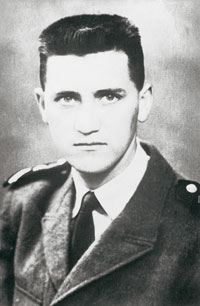
Captain Philippe Le Pivain, who was transferred to Germany in June 1961, rallied a short time later to the OAS with the permission of his father, Admiral Le Pivain. This young, thirty-two year old officer with an intelligence, bravery and purity of sentiments that commanded the admiration of all, sacrificed his career, his reputation and his family for this “ lost cause ”, – but nothing is lost when honour and charity are at stake ! Jacques Achard, the leader of the Delta commandos of Bab-el-Oued, wrote : « Captain Le Pivain inundated his neighbour with the revelation that fills him : his Catholic Faith. » Shortly before dying, he confided to a friend his intention of entering a monastery.
General Salan entrusted him the sector of Maison-Carré in the suburbs of Algiers. Le Pivain had immense notices painted on the walls : « Let us love one another. OAS. SALAN. » In his sector, a school attended by Muslims and Christians suffered an attack each week. Le Pivain spotted the fellaghas, executed them, and peace was re-established.
On February 6, 1962, the captain was warned by a police officer that he had been betrayed. Le Pivain, not wanting to postpone the rendezvous that he had made on orders from Salan with the leaders of the territorial units, went to it the next day, February 7. But, in Belcourt, at Jacques Grégori street, his car was stopped at a barricade. Scarcely had he stepped out of his car when an anti-riot policeman shot him in the back atclose range. He collapsed with his Rosary in his hand, and died.
« There are men, our Father wrote, that a State cannot allow to be properly judged, for fear of their purity, their grandeur. » And Madame Salan confided : « The only time I saw my husband weep was after the death of Captain Le Pivain. »
The spot where he fell became a place of pilgrimage, despite the CRS police who removed the flowers, candles, and destroyed the plaque “ Captain Le Pivain Street ” each time the people of Algiers attached it to the wall. On February 12, while the funeral Mass was taking place in the Mustapha hospital chapel, an immense throng prayed outside reciting the Rosary. More than a hundred thousand people followed thefuneral procession to the cemetery.
MARCH 18, 1962 : THE CAPITULATION OF ÉVIAN
On New Years Day, General de Gaulle announced that France intended to be done with Algeria « one way or the other », and that the army would be brought back to Europe that same year. This was a demagogic promise that constituted meagre relief for the families that had sons serving in Algeria. Nevertheless, far from ceasing its attacks, FLN increased them : by March they had reached thirty dead and forty wounded each day ! De Gaulle paid no attention to this. For him, the time was ripe for a general negotiation. A secret meeting took place in February, which prepared the last phase of negotiations that would be held in Évianfrom March 7 to 18.
It is worth noting the presence in Geneva of two hundred Chinese experts and economists, who were gathered for the 14-nation conference on the future of Laos and who did not forego coming to Évian “ to advise ” the Algerians. On March 18, after having satisfied all the FLN demands, de Gaulle concluded with the enemy « the most shameful capitulation of our history » Fr. de Nantes said. The cease-fire was decreed for March 19 at noon.
On March 23, a prelate from the Vatican Secretariat of State telegraphed to Msgr. Duval : « Deo gratias ! »
While Ben Bella and his auxiliaries were freed and left Aulnoye Castle, thousands of fellaghas left French prisons or their Tunisian exile to return to Algeria in order to participate in its « liberation », or rather to put it under a tight control-grid. On the day of its independence, Algeria would be totally controlled, from the cities to the smallest of villages by elements of the ALN, who were themselves supervised by their political leaders. It was then that the fate of the Muslims who had been faithful to France was hanging in the balance. They were caught in the net like so much unsuspecting game. No guarantee in the Évian texts assured their protection.
The French of the metropole made their decision by referendum on the following April 8, but those from Algeria were excluded from the consultation ! As could be expected, the April 8 referendum ratified Algerian independence by 64 % of registered voters. In Algeria, the vote would only take placeon July 1, 1962, under the sway of FLN terror.
For three months, we are ashamed to write it, it was with the support of the French army, administration, police forces and also with the money of French taxpayers that a puppet “ Provisional Executive ”, formed of bandits and procurers established at Rocher noir, a few kilometres from Algiers, took possession of all the machinery of the country, under the direction of the freemason Abdherramane Farès. The outgoing power and the newcomers had the same enemy : the French of Algeria.
THE RUE D’ISLY MASSACRE
The OAS then conceived the project of controlling the European and working-class district of Bab-el-Oued in order to protect its inhabitants against FLN terrorist incursions. The operation was launched on March 23, 1962. A commando from the Organisation disarmed a French army patrol there without violence. Then a second one. Since the soldiers protested, their arms were given back to them. At the third encounter, gunfire broke out : anofficer and five soldiers were killed.
This was a good occasion for those in power to break the resistance of the pieds-noirs. The riot-police immediately sealed off the district and entered it with their armoured vehicles that crushed everything that lay in their path. « The canon thundered, Francine Dessaigne related, the entire city trembled. T 6 planes appeared. They turned, went into dives, shot towards the terraces, and then started a fresh pass. » A curfew was decreed. Completely isolated, deprived of electricity, the district was no longer resupplied. According to official statistics, 7,148 apartments were searched and ransacked.
Under the pretext of searching for arms, the riot-police insulted and brutalised this industrious population. They sullied and ignominiously debased everything that connected it to France, flags in particular. « You no longer need flags,they were told, you are no longer French. »
On March 26, Colonel Vaudrey from the OAS called the citizens of Algiers to « a peaceful, unanimous mass demonstration, without arms and without shouting », in order to protest the blockade of Bab-el-Oued. The rendezvous was set at 3 p.m., at the square of the Main Post Office. The demonstration was to head for Bab-el-Oued following the Rue d’Isly. There a diabolical trap hadbeen prepared for them.
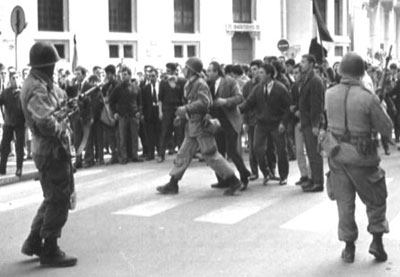
André Levy testified : « I was on the third-floor balcony of my place. Everything was calm and the crowd was growing larger. There reigned below the impression of a church bazaar. Women kissed the soldiers telling them : “ We are French and want to remain so; let us go through. ” And they wentthrough. »
My father, Georges Busson, arrived at the Main Post Office at 2 :30 p.m. At the entrance to Rue d’Isly, he saw a police cordon that was composed of young tense-looking Arab soldiers who were equipped with their combat gear : heavy helmets, machine guns, and they were commanded by a lieutenant of Kabyle origin, Ouchène Daoud, who was in an indescribable state of excitement. Papa explained to him the peaceful nature of the demonstration, the object of which was simply to obtain lifting the quarantine of Bab-el-Oued. But the lieutenant did not listen to him; he kept on looking at his watch and implored the demonstrators toleave.
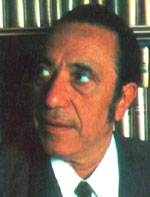
This section belonged to the IVth regiment of tirailleurs, which should not have been there in the operation. General Ailleret, the commander-in-chief in Algeria, had sent a note on March 17 to the Algiers Army Corps forbidding the use of Muslim tirailleurs to maintain law and order in the city. He knew that they were capable of firing at the European population in order to gain the indulgence of the future masters of power. It was the prefect of police, Vitalis Cros, who had them come to Algiers and placed them on that day, at that hour, at the entrance to Rue d’Isly. « I had all the soldiers under my requisition. I exchanged telephone calls with Michel Debré and even with the President of the Republic », he said.
At 2 :50 p.m., my father had already turned into Rue d’Isly with the first group of demonstrators when he heard behind him the rattle of automatic weapons. « Suddenly, a witness declared, without any shot being fired, without any provocation from the crowd, one of the tirailleurs shot without warning a long hail of bullets from his weapon, mowing down dozens of persons. »
« The crowd dispersed and people ran away from the police cordon, related Gilbert Alcaydé. Many people, including women and children, tried to take shelter in the doorway of the entrance to the Crédit foncier building : The firing was aimed at them first, and bodies fell one on the other until there was nothing but a bloody mass. For short moments, the fire of automatic weapons became less intense : this apparent pause corresponded to the time required for their reloading. »
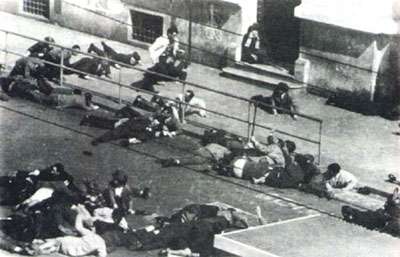
« My family, Christiane Rey testified, threw themselves to the ground. My mother recited the Ave Maria with all her heart. Voices encouraged her : “ Pray, Madame, pray for us ! We are unable. ” A little girl complained in a tiny voice : “ I am wounded; my stomach hurts; I am going to die ! ” Her mother reassured her : “ It is only fear. My stomach hurts, too ! ” But the child’s voice grew silent… forever. My father turned over on his back. An old reflex came back to him : “ An officer must see what is happening. ” And he saw… soldiers systematically spraying the crowd as it lay there from right to left, from left to right in volleys of seemingly endless duration. He saw the blood that splattered the walls and that little by little formed sticky puddles. He heard howls of fear and suffering, the plaints and prayers of people pleading formercy. »
The recording of the gunfire and these pleas would be broadcast the same evening, only once and no more, on Europe n° 1. One must hear these shouts : « Cease fire ! Lieutenant, order them to cease fire ! » Nevertheless the firing continued almost a quarter of an hour. An eyewitness, Daniel Pons, related : « After the firing ceased, I was able to see people get up and be shot at again, in particular two young girls passed in front of me, their hands raised, and they were machine-gunned. »
According to the Gaullist authorities there were 45 dead and 150 wounded. In reality there were 85 dead and more than 200 wounded.
A witness to the massacre, Colonel Bosviel wrote : « People have spoken about the troops panicking. This is not true. The tirailleurs knew full well what they were doing. I commanded them for more than thirty years, and I know their behaviour. They had certainly been told that they would go to this demonstration and that they would shoot at the crowd. » Just before the firing began at Rue d’Isly, Émile Duzer, a retired colonel of Muslim affairs, heard the Muslim tirailleurs speaking to one another : « One of them said in Arabic : “ Go on ! Shoot the Christians. ” And another one : “ They told us : Shoot the Christians. ” »
On April 3, 1962, during the meeting of the Committee on Algerian Affairs, de Gaulle declared that it was « indispensable to have fired to disperse the charms (sic !) ». Pierre Messmer, his Minister of Defence, added just as cynically : « Perhaps there was no other way to seal the great book, which hadbeen closed a few days earlier by the Évian Accords. »
DIARY OF AGONY
Msgr. Duval decided that the citizens of Algeria who were killed during this massacre would have no right to funerals in the churches of Algiers.
Despite the pro-FLN commitment of their archbishop, most of the parish priests shared the feelings and the suffering of their flock. Marie-Jeanne Rey, who was a young teacher at the time, remembers the religious ceremonies in Sainte-Marie Saint-Charles church :
« There was a throng. Since fate had treated them roughly, many of our fellow citizens had rediscovered the need to pray together. Sunday Mass became heartrending […]. Each week, the congregation seemed a little more sparse and downcast. The parish priest said farewell to those who were leaving and heaped affectionate recommendations on them. Those who went into exile knew what they were losing by leaving this church. Nowhere else would they find this profound understanding, this truelove, which had helped us so much. » 7
Oran, where the OAS was firmly implanted, also experienced tragic days. In this large city, theGaullist forces did not succeed in seizing the Radio-OAS transmitter.
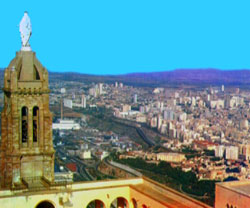
On March 25, 1962, while the fellaghas were profaning and looting a church in the Planteurs district, the riot-police’s armoured personnel carriers headed towards the transmitter, which had been located by helicopter. OAS commandos blocked the column. One of their leaders, who was brought face to face with a captain declared : « I am Muslim. My father is a bachaga and an officer of the Legion of Honour. Your government has deceived » The captain, who was shattered, let him run off. The same day, however, General Jouhaud was arrested. The OAS in Oran was decapitated.
On March 29, during the funeral service celebrated at the cathedral in the presence of Msgr. Lacaste, the Bishop of Oran, the archpriest, Canon Carmouze, evoked with emotion, « those who are dead so that Algeria may remain French and Christian, an ideal that, I believe, is not forbidden to those who made this country, to those who made it fruitful ». He then invited the faithful to pray « that Algeria may always remain inspired by a French, Christian ideal ». On May 10, the archpriest, « whose goodness, bachaga Boulama wrote, was legendary among the Muslims » was arrested in the middle of the night and placed in administrative internment.
On May 14, 1962, in several European districts of Algiers, commandos of armed men machine-gunned cafés and passers-by in the streets. The toll : twenty dead, sixty wounded. Immediately the metropolitan press claimed that it was an OAS provocation.
“ SPECIAL ” JUSTICE FOR THE OAS
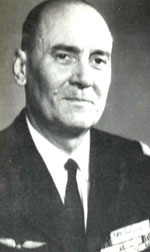
General Salan’s arrest in Algiers on Good Friday, April 20, was the result of treachery. He and Jouhaud were judged by a military High Court that de Gaulle had instituted on April 27, 1961. A decree from the executive power sufficed to have an accused handed over to it.
After a pretence of a preliminary investigation and three botched sessions, the military High Court condemned General Jouhaud on April 13, 1962. De Gaulle waited until November 28 to commute the death sentence to life imprisonment. For seven months, General Jouhaud expected every morning that he would be taken to be executed !
General Salan’s trial opened on May 15, 1962. « I am the head of the OAS, he declared. My responsibility is thus full and entire. I assume my responsibility and do not intend to deviate from a line of conduct that was mine for forty-two years of command.
« I am accountable to no one other than to those who suffer and die for having believed in the word of honour that was given them, in the promises that were made. »
Defended by the lawyer Tixier-Vignancour, Salan then remained silent throughout his entire trial.
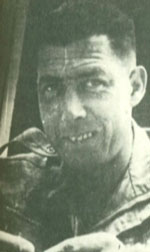
To General de Gaulle’s surprise on May 23, 1962 the military High Court granted that General Salan had attenuating circumstances. Furious that the tribunal had not complied with his orders by condemning the leader of the OAS to death, de Gaulle did not hesitate to dissolve it and replace it on May 30, by a “ military Court of Justice ”, and to force General de Larminat, a former member of the FFL (Forces Françaises Libres –Free French Forces) and a companion of the Liberation, to preside over this new special tribunal. Larminat avoided doing so by having himself hospitalised the day before the hearing in which he should have judged Lieutenant Degueldre, and committed suicide on July 1.
Degueldre, who was condemned to death, was executed at Fort d’Ivry on July 6, 1962. The soldiers of the firing squad purposely aimed poorly and not less than five coups de grace were required to finish off the lieutenant legionnaire, whose agony lasted more than ten minutes...
By a judgement of the Council of State on October 19, 1962, the “ Military Court of Justice ” was declared illegal. « The condemnations that it had passed were thus considered null and void. » 8 Thus, under the Gaullist regime one saw a death sentence executed to enforce a judgement and then had to consider it as though having never existed !
A CHRISTIAN DESTROYED
After the cease-fire of March 19, 1962, the FLN, which wanted to precipitate the exodus of the Europeans, developed a new tactic : kidnappings. Small groups of fellaghas seized their prey and carried them off without anyone ever finding them. In May 1962 in Algeria fifty kidnappings could be counted per day ! The few officers who stood in the way were sanctioned.
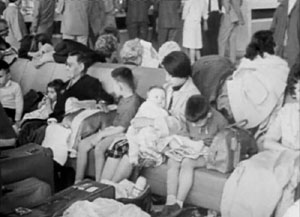 After the Évian Accords, approximately nine thousand Europeans were kidnapped by the FLN and reported missing. The women and young girls who were prisoners of the Muslim terrorists were forced into the most abject prostitution 9. Priests like Fr. Therrer, the parish priest of Sources in Birmandreis were assassinated. « Why was it not said in his funeral oration that he was assassinated by the FLN ? his parishioners protested. Why was it not recalled that the last months of his life were a veritable Calvary ? He saw his church, which had scarcely been built, profaned and looted twice. He saw his presbytery entirely burgled and his car stoned several times. Finally, on the evening of his assassination, the church was burned down. »
After the Évian Accords, approximately nine thousand Europeans were kidnapped by the FLN and reported missing. The women and young girls who were prisoners of the Muslim terrorists were forced into the most abject prostitution 9. Priests like Fr. Therrer, the parish priest of Sources in Birmandreis were assassinated. « Why was it not said in his funeral oration that he was assassinated by the FLN ? his parishioners protested. Why was it not recalled that the last months of his life were a veritable Calvary ? He saw his church, which had scarcely been built, profaned and looted twice. He saw his presbytery entirely burgled and his car stoned several times. Finally, on the evening of his assassination, the church was burned down. »
The Christian community of Algeria counted five hundred sixty-seven churches. During the following months, more than four hundred of them would be closed, profaned, and sometimes transformed into mosques or destroyed.
During May and June 1962, the European population left the bled to pack themselves into the cities before embarking in a terrible rush to metropolitan France in the first days of July. How many personal and family calamities were carried off in these tragic days, days marked forever in letters of blood and tears in the memory of the French of Algeria !
Two days after the referendum of July 1, which resulted in 99.7 % ayes (sic !), de Gaulle officially proclaimed Algerian independence. In the meanwhile, in Oran, Hell was unleashed. On July 5, 1962, the anniversary of the capture of Algiers in 1830, an appalling act of carnage took place in the city because the twelve thousand French soldiers were confined to barracks. General Katz, the Army Corps commander, known as “ the butcher of Oran ”, had received the express order from General de Gaulle not to intervene 10. That day in Oran, there were approximately three thousand dead or missing.
JESUS WAS WITH HIS MARTYRS
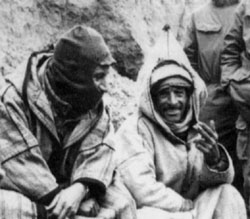 During the entire summer of 1962, the harkis, who had been disarmed by French officers, were massacred in a dreadful manner by the ALN : « Some were crucified on doors, with eyes gouged out, nose cut off, tongue torn out and were systematically emasculated. Others were torn to pieces alive with tongs, stoned, scalded, bound hand and foot and thrown into blazing infernos before horrified populations that had been gathered together. » 11
During the entire summer of 1962, the harkis, who had been disarmed by French officers, were massacred in a dreadful manner by the ALN : « Some were crucified on doors, with eyes gouged out, nose cut off, tongue torn out and were systematically emasculated. Others were torn to pieces alive with tongs, stoned, scalded, bound hand and foot and thrown into blazing infernos before horrified populations that had been gathered together. » 11
A non-commissioned officer onétif region related : « The Beni-Lalem harka (militia unit) was entirely massacred. The leader of this harka, who was famous in the whole region for his courage, although he had been tortured, shouted out to the men of the ALN : “ To the last drop of blood, we are French. You can kill us, that will not change our heart ” » 12.
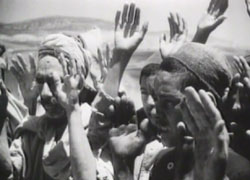 Our Father wrote : « Jesus is with His martyrs and even with the tragic and grotesque disjointed puppets that are trailed around over there with a ring in the nose, covered with a thousand wounds, with their eyes gouged out : Muslims who had believed the “ roumis ” and who enlisted for the defence of the civilisation of the “ Nazarenes ”. Pace the theorists of decolonisation, through the French flag it was Christ whom they had glimpsed, and they are dying from their fidelity, while we are sleeping in our betrayal » 13
Our Father wrote : « Jesus is with His martyrs and even with the tragic and grotesque disjointed puppets that are trailed around over there with a ring in the nose, covered with a thousand wounds, with their eyes gouged out : Muslims who had believed the “ roumis ” and who enlisted for the defence of the civilisation of the “ Nazarenes ”. Pace the theorists of decolonisation, through the French flag it was Christ whom they had glimpsed, and they are dying from their fidelity, while we are sleeping in our betrayal » 13
In order to save their harkis and their families from savage reprisals, certain French officers organised their withdrawal to metropolitan France. But the Gaullist government was opposed to it. This directive was enforced and the native harkis who arrived in the port of Marseilles were turned away and forcefully sent back to Algeria...
At that time, the press spoke of ten thousand victims. The documents that the bachaga Boualam published show that there were at least a hundred fifty thousand harkis assassinated. A note from the Historical Service of the army dated April 21, 1977 and signed by General Porret, confirms it. It was a veritable genocide, the alarming responsibility of which is born by de Gaulle and his Vth Republic.
THE CHURCH’S PRACTICAL APOSTASY
« On July 1, feast of the Precious Blood of Our Lord, the Christian handed Algeria over to the Muslim assassin. This monstrous surrender is the fruit of a strict collaboration, a clever, cunning collaboration replete with violence, a collaboration of those in power with the Enemy in the crucifixion of a historical community, French in name and Christian in soul. » 14
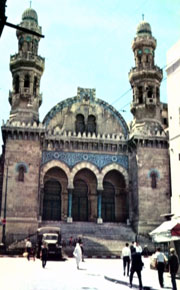
Here is a fact that illustrates this surrender to Islam. On July 6, the cathedral of Algiers was profaned by eight hundred Muslims whom an imam harangued. Then, from the pulpit a sergeant of the local force spoke very highly of Msgr. Duval, who consented to hand over his cathedral for it to become a mosque, as had the cathedrals in Constantine and Cherchell. « In Algeria, he said, the Church, as she ought, did not choose to be foreign, but Algerian. »
On July 7, 1962, the Archbishop of Algeria received a telegram from Pope John XXIII, the text of whichwas immediately published in the press.
« On the occasion of the proclamation of Algerian independence, the Sovereign Pontiff formulates fervent wishes of prosperity for the new State, hoping and praying for the harmonious collaboration of the various communities, which is encouraged with so much zeal by your Excellency. His Holiness invokes whole-heartedly on all the inhabitants of the Algerian landthe abundant blessings of Almighty God. »
This scandalous telegram verified what our Father wrote in his Letter to My Friends on May 6, 1962 : « We are experiencing the practial apostasy of the Church. » This meant that for him, a defender of French Algeria, the battle had only begun.
Brother Francis of Mary of the Angels
1. Cf. He is risen ! n° 57, June 2007, pp. 11-20.
2. The Francs-tireurs partisans (FTP, “ Partisan irregular riflemen ”) were fighting formations of the French Resistance during World War II, which had as a political front the Front National movement that the French Communist Party (PCF) members Jacques Duclos and Pierre Villon had created.
3. 600 jours avec Salan et l’OAS, 1969, p. 162.
4. Réquisitoire contre le mensonge, pp. 302-303.
5. Letter of March 24, 1962.
6. Letter to My Friends n° 109, May 1962.
7. Mémoires d’une écorchée vive, 1987, pp. 217 and 413.
8. Jaffré, p. 334.
9. Capitaine Leclair, Disparus en Algérie, 1986, p. 244.
10. Geneviève de Ternant, L’agonie d’Oran, 1996, p. 49.
11. Camille Brière, Ceux qu’on appelle les pieds-noirs, 1984, p. 186.
12. Bachaga Boualam, Les harkis au service de la France, 1963, p. 262.
13. Letter to My Friends n° 116, August 20, 1962.
14. Letter to My Friends n° 112, July 1, 1962.